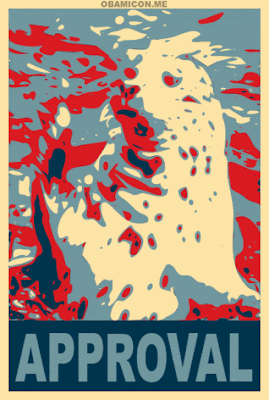
The best of online criticism in January:
- A guide to the best superhero comics from This Recording.
- Both parts of the late Ted Solotaroff's memoir-essay "Adventures in Editing" are now up at The Nation (Part I, Part II). Solotaroff edited the seminal journal New American Review, among other things.
- The online film journal Reverse Shot is often accused of excessive Young Turkism—impetuosity, strategic contrarianism, and erratic militancy. I think their coverage of film is really solid, though. Their year-end wrap-ups are all worth reading, but my favorite was their 11 Offenses of 2008. Other wrap-ups are Best of 2008, Get Over It 2008 (a feature on overrated films that aren't offenses, but which are nevertheless completely mediocre), But What About... (similarly, a B-List to the "Best Of" feature), and the catch-all Reverse Shot's 2 Cents.
- Martin Puchner covered the death of Harold Pinter for n+1. I read a number of excellent assessments of Pinter's impact on theater, but this was clearly the best.
- On Pop Matters's Marginal Utility blog, Rob Horning has a fascinating post about dilettantism up. I think his use of Guitar Hero as a context for this discussion is a little weird, but the rest of it is really good.
Dilettantism is a perfectly rational response to the hyperaccessibility of stuff available to us in the market, all of which imposes on us time constraints where there was once material scarcity. These time constraints become more itchy the more we recognize how much we are missing out on (thanks to ever more invasive marketing efforts, often blended in to the substance of the material we are gathering for self-realization). We opt instead for “diversity,” and begin setting about to rationalize the preferability of novelty even further... Concentration takes on more of the qualities of work—it becomes a disutility rather than an end vis-a-vis the stuff we acquire. If something requires us to concentrate, it costs us more and forces us to sacrifice more of the stuff we might otherwise consume. In other words, consumerism makes the will and ability to concentrate seem a detriment to ourselves.
I have some further thoughts about this particular problem coming up.
- Ray Davis makes a really terrific case on The Valve for what to do about the thorny problem of work in the humanities that makes use of writers who either had shoddy research habits or have been factually disproved (e.g. Freud, Weber, Foucault). First, he argues that "the equivalence of citations with logical premises is itself an assumption in need of examination" and goes on to show how many if not most citations of Foucault's Discipline and Punish are either analogical or purely referential (i.e. "for an examination of x, see y") and do not affect the structure of the argument presented in the body of the text. Davis broadens the argument by asserting that the role of citations is often simply pretextual—the point is "to find a third party to interrupt, to incite, to provide some friction and spark in what might otherwise become a rather dull cocooning of the author-and-topic couple." This takes him to a fairly extreme conclusion: "The 'scientific' heroism of Freud (and Foucault, and Nietzsche, and so on) didn’t include careful transcription of sources, painstaking replication of results, or double-checked blind studies, but it did require expressing engaging and potentially unpleasant thoughts applicable across a range of enduringly interesting problems. Which is to say such humanities scholarship can be 'true' or 'false' somewhat as a novel or poem is true or false, with a truth-value that’s utilitarian and context-dependent." It's a very provocative post, and Davis presents his case engagingly.
- I discovered the excellent blog I Cite this month, and I'd like to point to two posts in particular: this post on tag clouds and the increasing shift to quantitative analysis of rhetoric, and this post on the curious academic injunction "to speak to a broad audience":
On the other hand, the instruction to formulate one's speech so as to be accessible to the disadvantaged proceeds as if 'ordinary language' were the language of the disadvantaged rather than the language of hegemony. A kind of sweeping, massifying of language occurs that eliminates the multiplicity of discourses within the field of language and this in the name of a democracy inseparable from consumerism. Rather than demonstrating the fact and workings of another way of speaking and thinking, the speaker is supposed to hide this fact, not to make it apparent in the open setting of a public lecture. And so the myth of equality is upheld and the differentials of power kept underwraps.
- Paul Virilio must be one of the strangest contemporary theorists (he ends this interview with a quote from Churchill of all people), but he says some exceedingly intriguing things here, ideas that open out onto whole projects of inquiry. For example:
Since speed earns money, the financial sphere has attempted to enforce the value of time above the value of space. But the virtual is also part and parcel of reality. And to be frank with you, this so-called virtual world, in which one can also include tax-heavens, is a form of 'exotism' which I tend to equate with colonialism. It is the (recurrent) myth of another inhabitable planet.
I have his Speed and Politics; I should really get to reading that.
 The best of online criticism in January:
The best of online criticism in January:
Comments